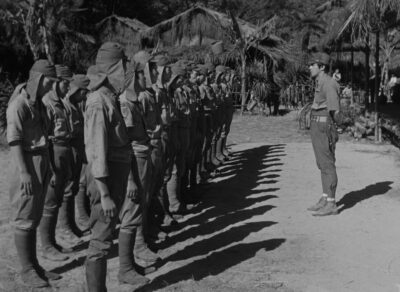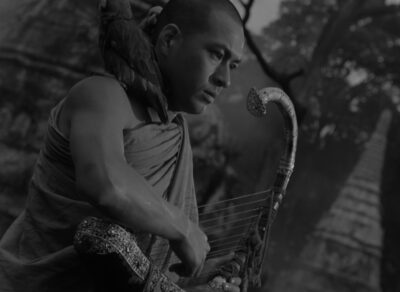In the last days of World War II, a Japanese platoon sustains morale through the Burma campaign by singing traditional songs, accompanied by the delicate harp-playing of Private Mizushima. After the unit surrenders to British forces, Mizushima is tasked with convincing a holdout of cave-dwelling Japanese soldiers to lay down their arms; when his mission fails, he is counted among the dead. Mizushima survives, however, and becomes a monk who dedicates his life to providing proper burials for his fallen comrades. Meanwhile, his former platoon attempts to track him down by using music to express a shared sense of separation and longing for home. Adapted from Michio Takeyama’s classic novel, and renowned for legendary composer Akira Ifukube’s haunting score, Kon Ichikawa’s The Burmese Harp is an epic humanist masterpiece—a profound contemplation of suffering, redemption, and spiritual fortitude during the darkest periods of violence.
“A HAUNTING ELEGIAC REVERIE.” – Kevin Thomas, Los Angeles Times
“Poetically photographed… brilliantly dots the players against the looming terrain.” – Howard Thompson, New York Times
Production history (via Janus Films):
In the early 1950s, Kon Ichikawa was toiling away for Toho Studios, churning out several films a year (in 1951 alone, he directed six) and settling into the role of a dependable if unremarkable metteur en scène. It was during this period that Ichikawa read The Burmese Harp— Michio Takeyama’s popular children’s novel from 1946—and “felt this strong sense of mission, a call from the heavens” to adapt it on film. This fascination would transform the director’s career, catapulting him into the upper echelons of Japanese cinema.
At the time, Ichikawa was working closely with his wife, screenwriter Natto Wada, who authored or coauthored many of his scripts. Whereas Takeyama’s novel was conceived as a “fairy tale for adults,” Ichikawa intended a grittier take on the human suffering of World War II and the Japanese military’s self-destructive nationalism. Ichikawa and Wada also shifted the dramatic emphasis by having the protagonist, Private Mizushima (Shoji Yasui), decide earlier in the story to remain in Burma to bury his dead comrades, after Japan’s failed campaign there. And while in Takeyama’s tale, cannibals nurse Mizushima back to health in hopes of eating him—“exotic” details from a novelist who had never set foot in Burma—in Ichikawa’s version, the soldier is saved by a Buddhist monk, whose noble compassion in service of others is one of the film’s major themes.

Ichikawa inked a three-picture contract with Nikkatsu in 1954, but— since he was still a novice—he hesitated to pitch such an ambitious project. When he finally did, he found himself on the outside of the deal: the studio’s higher-ups initially selected veteran Tomotaka Tasaka to helm the picture on the strength of his successful war films Five Scouts (1938) and Mud and Soldiers (1939). Ichikawa stepped in when Tasaka took sick, but the younger director would have to compromise his initial vision. At the time, Nikkatsu used Japanese Konicolor stock, combining three strips of film to render a full color palette. However, this process was expensive, a Konicolor-friendly camera would be too cumbersome to bring to Burma—and there would be no way to fix it if it broke down. Harp would have to be shot in black and white instead of his desired color.
The Burmese Harp would also have to be largely shot in Japan; Nikkatsu ruled out Burma for most of its location footage, as it would be finan cially and logistically impossible to transport the actors there. Only Yasui would travel to Burma, for his more solitary scenes; locations in and around Odawara, Hakone, and Izu backgrounded the other actors, forcing Ichikawa to trick Japanese environments into evoking the tropical foliage and intense heat of Burma. Meanwhile, the black-and-white stock inspired Ichikawa, with the help of cinematographer Minoru Yokoyama, to shoot with strong contrasts—a decision that led them to alternate flat and angled lighting, employing telephoto lenses for long shots and wide angles for close-ups.

For the cast, Ichikawa sought someone who could convey Mizushima’s innocence, idealism, and sincerity. Nikkatsu didn’t have many young actors then, but Yasui, in his mid-twenties, was one; though he hadn’t yet taken on many big roles, Ichikawa liked this very gentleness and inexperience for Mizushima. The film’s other major part, Captain Inouye, was played by Rentaro Mikuni, who had waged fierce con tract battles with various studios. On the set of Harp, he engaged in a weeklong standoff with Ichikawa: a former soldier in World War II, Mikuni knew that his character, according to military rank, shouldn’t wear a certain badge on his uniform, and he refused to proceed until the detail was changed. Ichikawa eventually gave in, and any remaining tension between them vanished when Mikuni turned in a powerful performance for the film’s climactic scene, in which Inouye reads Mizushima’s emotional letter to his former comrades. For this moment, Mikuni called upon his own traumatic memories of combat.
Ichikawa also clashed with composer Akira Ifukube over the tone of The Burmese Harp’s titular instrument. During shooting, the harp that Mizushima plays to accompany his singing comrades was just a prop, so its distinct tonality had to be dubbed in during postproduction. Ichikawa and Ifukube tried out dozens of Western harps and Japanese instruments until they agreed on one with an appropriately “beautiful sound.” The film’s main musical motif—a sentimental song called “Hanyo no yado,” or “Home! Sweet Home!,” performed by Inouye’s platoon—was recorded via sync sound and later mixed with a choir of “regular people,” including some who were tone-deaf, to realistically evoke the troops’ lack of musical training.
Nikkatsu distributed The Burmese Harp by dividing the film into two sections that were released three weeks apart in early 1956. After its initial Japanese run, the 143-minute Harp was trimmed to 116 minutes for re-release and international markets— a version that Ichikawa never sanctioned. (The original cut of the film has unfortunately been lost.) Ichikawa also didn’t know that Nikkatsu had submitted the film to the Venice Film Festival, where it was awarded the San Giorgio Prize and an OCIC Award (Honorable Mention).
The Burmese Harp was nominated for an Academy Award for Best Foreign-Language Film, securing Ichikawa’s and Wada’s global renown. In 1985, when Ichikawa remade Harp in color, it became the top-grossing film of that year in Japan, reinforcing the original’s status as an enduring classic—and one of the greatest anti-war tales ever committed to celluloid.
